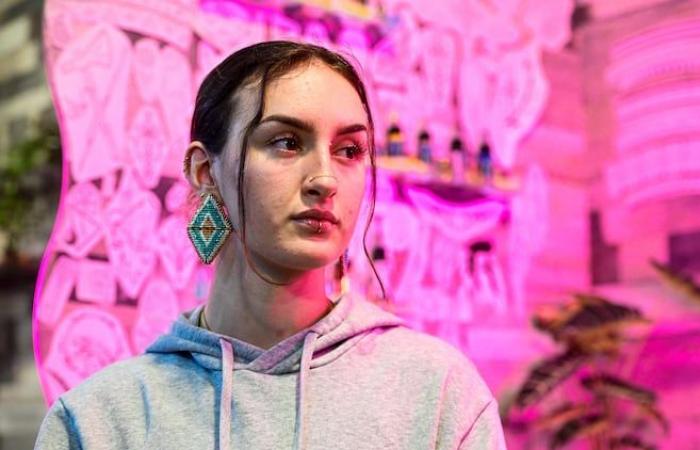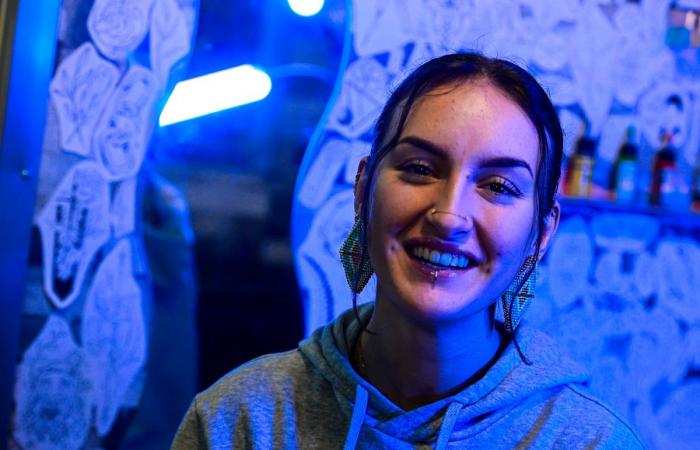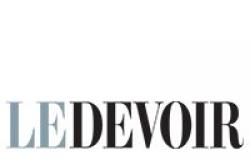Marilou Bastien receives The Sun in his studio in Wendake. The atmosphere is cozy and warm. Soft music echoes through the speakers at the entrance.
At 23, she is the only tattoo artist in Wendake.
“In my head, the plan was never to take up tattooing and make it my career,” she recalls. It was for fun.” Self-employed for several years, the young Wendat dreamed of being a surgeon, but the COVID-19 pandemic and her artistic abilities decided otherwise.
Marilou Bastien’s passion for tattooing allows her to learn more about Wendat culture. “There is one side that I have touched all my life and another that I learned myself,” she says. (Caroline Grégoire/The Sun)
Guided by her mentor Terry Dactel, a Wendat tattoo artist based in Montreal, Marilou Bastien has quietly become familiar with the principles of her art, but also with the cultural nuances that she infuses into her practice. “We have the same indigenous roots which come with the desire to do things well and to serve our world,” she explains, praising the one who took her under her wing.
“When you’re an Indigenous tattoo artist, there are two worlds. There is the tattoo itself and the spiritual side. He was someone who could also teach me that aspect.”
— Marilou Bastien, Wendat tattoo artist
Now installed in her own studio, in the heart of the community where she grew up, Marilou Bastien navigates all the realities involved in the marriage between traditions, culture, identity and tattooing.
Promote your culture
On one of the walls of his premises, dozens of sketches are displayed. Behind each of them, the story of a client, which Marilou Bastien can tell from memory. All the details of the drawings are full of meaning. From the double curve to sweetgrass, wampums and the tree of life: no symbol is left to chance and the artist makes a point of respecting the authenticity of indigenous cultural emblems.
“If a symbol is traditional or very cultural and it means something, I would make it lose its meaning if I tattooed it on anyone. If it’s a symbol of identity or traditional practices and I tattoo it on everyone without considering the meaning, what does it become for everyone for whom it is truly meaningful? she questions.
“Sometimes, these are things that we see repeatedly without knowing the meaning, but they are still part of us. On the other hand, if a customer wants any symbol just because, it doesn’t make sense.”
The majority of Marilou Bastien’s clients are indigenous. “I am not an indigenous tattooist for the Wendat, I am an indigenous tattooist for the indigenous people,” she explains. (Caroline Grégoire/The Sun)
The artist therefore ensures, by researching, questioning and educating his clients, to limit cultural appropriation in all its forms. “These are rules that I give myself according to my values. The important thing is to have the reflex to do your research and ask yourself the question. It’s a bit of a headache,” she explains with a laugh.
A process of affirmation
For its clientele, “mostly indigenous”, tattoos can be part of a “step to assert their identity”. True tools for reconnection and cultural affirmation, Marilou Bastien’s works must be in line not only with the intention of her clients, but also with their identity and cultural symbolism.
“I think it can particularly help those who are not returning to the community, but who have always been in Wendake and who use tattoos to assert themselves,” she gives as an example.
In-depth research on Wendat culture and constant exchanges with members of other Nations allow him to distinguish what is culturally relevant in addition to suggesting alternative proposals, if the situation requires it. “I will put an intention behind my creation, according to what the client has expressed to me. Ultimately, it may not be a precise symbol, but it makes sense with what the person is looking for,” she says.
“The reason why I decide whether or not to tattoo certain things on certain people and not on others is to maintain the symbolism. My goal is not to make reconnection more difficult, it’s just to create something that is truly meaningful.”
Create now
Marilou Bastien establishes a clear nuance between her practice, cultural tattooing, and traditional tattooing. “In the end, what I do is to integrate cultural elements into the tattoo, it is not necessarily what the Wendat had tattooed before,” notes the artist.
For her, however, the modernity of her artistic proposal in no way diminishes its value.
“When we revitalize a language or a culture, we always look at what has been done before and some think that that is all that is valid. We can’t blame people for relying on the past to revitalize, but it’s not just our ancestors who are Wendat, we too and we are capable of creating,” she emphasizes.
“We are Wendat today. We must create things today that are Wendat without always referring to tradition. There is also what we create and what we experience now.”
Propelled by this need to be heard and to create in the present, Marilou Bastien is already considering the next step. “In my future plans, I would like to have a tattoo shop mobile to do the Pow-Wow route,” she lets it go. “I’m going to take my time to do it because I want it to be done well, but we have to fill the need in the communities.”







